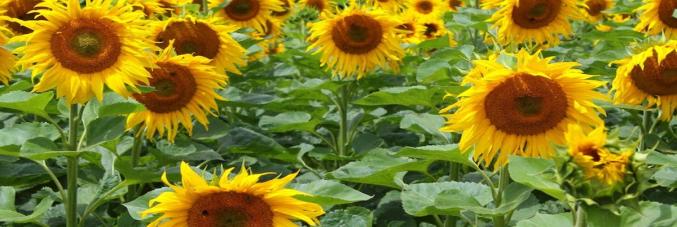
Nature-inspired solutions to sustainably increase agricultural yield
18.11.2020
The University of Padua is a consortium partner managing the GAIN4CROPS project, launched in May of 2020, the 5-year long project is working towards improving the photosynthetic efficiency of sunflowers with natural solutions and innovative reproduction techniques.
The goal of the GAIN4CROPS projects is to introduce crop plants that reduce the use of the main agriculture resources of soil, nitrogen and water. Its focus is to develop novel disruptive technologies to overcome photorespiration, one of the main constraints on photosynthetic efficiency. Photorespiration is a process that reduces CO2 assimilation efficiency, and thus biomass yield and agricultural productivity. The experience gained will serve as an example for other plants and pave the way for innovative crops as climate resiliency and reducing resource consumption leads to more sustainable agriculture.
The majority of plants (85%), including rice, wheat, soybeans and all trees, perform photosynthesis through the so-called C3 metabolism. Photosynthetic efficiency is compromised at higher temperatures by photorespiration, hence limiting its yield. However, some plants have developed alternative metabolic strategies to naturally circumvent this waste by accumulating CO2 in specific compartments, thus creating an environment unsuitable for photorespiration.
Inspired by one of these naturally occurring metabolisms GAIN4CROPS proposes a series of changes aimed at progressively improving photosynthetic efficiency. The Consortium aims to further improve the process with metabolic pathways that make better use of cellular resources by avoiding the release of CO2 back into the atmosphere. "Previous attempts to include new metabolisms in crop plants have proved to be very complicated, mainly due to the difficulties encountered while introducing a de novo leaf anatomy and entering into a complex cellular regulatory network," explains Project Coordinator Prof. Andreas Weber from the Institute of Plant Biochemistry of the Heinrich Heine University Düsseldorf. "On the other hand, GAIN4CROPS relies on the natural physiology of the sunflower that already holds the innate ability to evolve towards an optimized metabolism and ultimately towards greater agricultural productivity."
Overall, the approaches developed in GAIN4CROPS have the potential to decrease the use of three key resources in agriculture, soil, nitrogen and water. A more efficient photosynthetic rate increases agricultural yield per each unit of land, thus avoiding the expansion of agricultural soil and the need to use larger amounts of nitrogenous fertilizers and water.
The benefits of using GAIN4CROPS plants become more evident at higher temperatures, as the project aims at developing climate-resilient crops needed to address the consequences of climate change
"We are facing the huge challenge of supporting a food production capable of sustaining the growing global population as well as the additional uncertainty of climate change,” explains Tomas Morosinotto, Professor at the Department of Biology and University of Padua Team Leader. This project will develop highly innovative strategies in selecting plants that are more efficient in using atmospheric CO2 and therefore making them more productive."
“With GAIN4CROPS, we join the current efforts to align land use and food production to conserve biodiversity, reduce the environmental impact of agriculture, and deliver sufficient amounts of healthy foods,” says Prof. Weber. Indeed, sunflower oil is a healthy alternative to other edible oils, such as palm oil.
Funded with 8M euros under the European Union's Horizon 2020 framework program, GAIN4CROPS is managed by a consortium composed of 3 research organizations; Max Planck Society, CEA and Agroscope. As well as 6 institutes of higher education, the University of Heinrich Heine in Düsseldorf, University of Rostock, University of Cambridge, University of Padua, the University of Estonia for Life Sciences and the University of Groningen, along with one industrial representative (Corteva Agriscience), and 3 PMIs, IN Srl, NRGene Ltd, and Genomix4Life.



